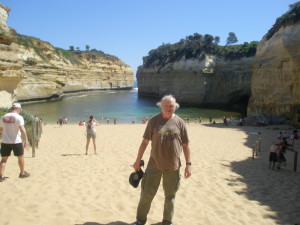 Age: 63 But you have my permission to invert the numbers.
Age: 63 But you have my permission to invert the numbers.
Location: Cambridge, Massachusetts
Education: University of Maryland Night School
The Writer
How long have you been writing?
I’ve been writing since I was a boy—and started to send out poems in my late 20’s.
Do you have a specific writing style?
I jokingly say it’s “Suermondt’s Formalism”, though no formalist would agree. I just try to write the poem/s as well as I can.
Do you see writing as a career?
If a labor of love can be considered a career, the answer is yes.
Do you write full-time?
No, but I write quite a lot, which includes doing prep work in my head once something has struck me as being a possibility for a poem. I also write reviews for Cervena Barva Press and other outlets, and evaluate poems for Bellevue Literary Review.
What do you consider to be your greatest accomplishment as a writer?
Just actually getting a poem written—one that you’re arrogant enough to feel is pretty good and think that readers might enjoy.
What is your ultimate goal as a writer?
Outside of winning a Pulitzer or a Nobel? Really it’s to keep writing poems as long as I can, hoping one day to write one as great as the poets I love have.
The Work
Tell us about your work in Crack the Spine.
THEY’RE OFF—which usually is what’s said after racehorses leave their chutes.
Is there a main theme or message in this piece?
Well, it’s a nod to the life of books and, by extension, readers and writers. I bet there are many writers who sense that a book has a life of its own, outside of its cover and words on the page. It’s a nice sense to have.
What inspired “They’re Off?”
My imagination and my kinship with all the books I have and will read.
How long did it take you to complete this piece?
I can’t say exactly, but not too long once I got rolling on the poem.
Tell us about another project you have published or are currently working on.
I’ve published three chapbooks—the latest, THE ART OF WAVING last year with Cervena Barva Press. I’ve also published two full-length collections: TRYING TO HELP THE ELEPHANT MAN DANCE (The Backwaters Press, 2007) and JUST BEAUTIFUL (New York Quarterly Books, 2010.) I also have three full-length manuscripts looking for a home, with a fourth one on the way.
Where can we find these chapbooks?
The two full-length books of poems can be found at many venues, such as Amazon, Barnes & Noble…and they can also be had from the presses themselves.
The Methods
How often do you write?
When I was in the “working world” I wrote primarily at night. Now that I’m free I write throughout the day, but much less at night.
What are your thoughts on self-publishing vs. traditional publishing?
My first chapbook was self-published by The Print Center in NYC, and I felt great about it. I’ll still cherish it even if by some miracle Norton, Knopf or Random House come calling—and even if they never do.
How many drafts do you generally go through before you consider a piece to be complete?
That varies. Some poems take a lot of work, but some times the poetry gods give you a poem that you can nail much easier
What are your thoughts on writing at a computer vs. writing longhand? I used to work entirely in longhand, but now with the computer the screen gets most of my attention. Remember, I’m a young 63.
What is your usual starting point for a piece?
I try to pay attention and if something moves me to thinking it could be made into a poem, I start marinating it and see where it leads. There’s no usual starting point.
How do you react to editorial rejections of your work?
I’ve developed a pretty thick skin over the years, but I still call the offenders every name in the book (and it’s some colorful book!) but I also drop it rather quickly and move on, send them elsewhere and get my antenna out for the next poem or poems.
How do you react when one of your submissions is accepted for publication?
With gratitude and delight—it’s always gracious of an editor and press to take work. Many years ago I wrote to tell David Ignatow that a poem of mine had been accepted (a rare occurrence in those days) and he wrote back, saying “ now you know you have something to say that others want to listen to.”
What is your best piece of advice on how to stay sane as a writer?
Take poetry seriously—it’s such a marvelous art and demands your best, but don’t take yourself too seriously—let the poetry make you noble.
The Madness
Who is your favorite author?
That’s as impossible to answer as ‘what’s your favorite book?’ The works of Albert Camus have stayed with me, and as for a poet… I’ll name Pui Ying Wong. And not just because she’s my wife and will blush at this, but because she’s a wonderful poet
What is the greatest occupational hazard for a writer?
To think you know it all. I find that the more I know, the more I realize there’s so much I don’t know and will never know. I do know hotshots who’ve done very well in the poetry world, but who are so pompous I make for the door, quickly.
What’s in that cup on your desk?
Coffee or wine, sometimes mixed together. Just kidding.
Rain or Sunshine?
Sunshine after rain
“No Thanks” or “I’ll have another”?
The latter, please.
The Beatles or The Rolling Stones?
Oldies, but both.
Additional Reading on Tim

Great interview. I enjoyed it so much.
Tim Suermondt is a poet who simply doesn’t disappoint, whether he is writing about a foreign land, or a baseball team, or the sun on the pavement. He has the natural poet eye and sees below things. Enjoyed knowing more about him in this fine interview!
Excellent and enjoyable interview, giving us a glimpse into the quixotic mind of a very fine poet.
Great interview: funny, wise, humane, like his poems. Thank you for sharing this
Tim Suermondt is a fine and wise poet, a poet to be listened to, a poet who knows what he is talking about. “Take poetry seriously—…but don’t take yourself too seriously.” Excellent interview, Tim!
swinging beneath the moon whenever I want….wish I had composed it…
A perceptive interview with fine insight, depth and passion. I enjoyed reading it.